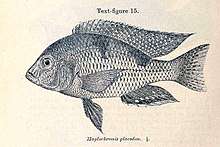Trematocranus placodon
Trematocranus placodon is a species of cichlid fish endemic to Lake Malawi, Lake Malombe and the upper reaches of the Shire River in Africa. It is mainly a shallow-water species that prefers to occupy areas with patches of Vallisneria, but it can occur as deep as 31 m (102 ft).[1][2] It can reach a total length of up to 25 cm (9.8 in).[2]
| Trematocranus placodon | |
|---|---|
 | |
| Scientific classification | |
| Kingdom: | Animalia |
| Phylum: | Chordata |
| Class: | Actinopterygii |
| Order: | Cichliformes |
| Family: | Cichlidae |
| Genus: | Trematocranus |
| Species: | T. placodon |
| Binomial name | |
| Trematocranus placodon (Regan, 1922) | |
| Synonyms | |
| |
It feeds mainly on aquatic snails and has a preference for Bulinus nyassanus, making this cichlid beneficial to humans as that snail is an intermediate host of the parasite bilharzia (schistosomiasis).[1][3] It has been suggested that an increase in bilharzia in Lake Malawi has been caused by overfishing of this and other snail-eating cichlids.[4][5] It is mainly caught as a food fish, but also for the aquarium trade.[1][2][5] Although it has seriously declined in some regions, overall it remains widespread and it is considered a species of least concern by the IUCN.[1]
References
- Konings, A. & Kasembe, J (2018). "Trematocranus placodon". IUCN Red List of Threatened Species. 2018: e.T60948A47224676. doi:10.2305/IUCN.UK.2018-2.RLTS.T60948A47224676.en.
- Froese, Rainer and Pauly, Daniel, eds. (2013). "Trematocranus placodon" in FishBase. April 2013 version.
- Evers, B.N.; Madsen, H.; McKaye, K.M.; Stauffer, J.R., Jr. (2006). "The schistosome intermediate host, Bulinus nyassanus, is a 'preferred' food for the cichlid fish, Trematocranus placodon, at Cape Maclear, Lake Malawi". Ann Trop Med Parasitol. 100 (1): 75–85. doi:10.1179/136485906X78553. PMID 16417717.CS1 maint: multiple names: authors list (link)
- Madsen, H.; Stauffer, J.R., Jr. (2011). "The burrowing behaviour of Bulinus nyassanus, intermediate host of Schistosoma haematobium, in Lake Malaŵi". African Journal of Aquatic Science. 37 (1): 113–116. doi:10.2989/16085914.2012.666383.CS1 maint: multiple names: authors list (link)
- Stauffer, J.R.; and H. Madsen (2012). Schistosomiasis in Lake Malawi and the Potential Use of Indigenous Fish for Biological Control. Pp. 119—140 in: Rokni, M.B., editor. Schistosomiasis. ISBN 978-953-307-852-6.
